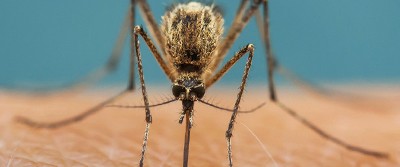Protein Helps Mosquitoes Detect Human Sweat

By Kevin Ritchart
Geneticists are closer to figuring out how mosquitoes detect our sweat. They have identified a scent-sniffing protein in mosquito antennae called IR8a that can sense the lactic acid coming off our skin.
A large part of the human scent comes from the lactic acid excreted through the skin and by the many microbes that live on our skin.
The Aedes aegypti mosquito is known to prefer human blood to the blood of other animals. Since the 1960s, researchers have suspected that lactic acid might be one of the key reasons why Aedes aegypti target humans.
We might not think of this mosquito as more than a minor annoyance, unless you consider that the Aedes aegypti is known to spread the viruses that cause Zika, dengue fever, and many more.
Sweat Equity
Geneticist Matthew DeGennaro and his team at Florida International University worked with Aedes aegypti that produce the proper form of IR8a as well as some that make an altered form of the protein that doesn’t function properly.
Both sets of mosquitoes were offered a sweat-covered human arm or a sweat-stained shirt sleeve. The mosquitoes with the altered form of IR8a were only half as likely to land on the skin or fabric as those with the proper IR8a. DeGennaro and his team shared their findings earlier this year in Current Biology.
The system that mosquitoes use for scent detection is quite complex, according to DeGennaro. They rely on three families of odor-sniffing proteins, all of which have overlapping abilities to identify substances present in the air.
Finding a Target
The IR8a protein detects acids, among other compounds. As a mosquito searches for a target, it combines cues relating to airborne chemicals with information about heat, moisture, and visual clues about potential bite sites.
Additionally, mosquitoes are able to detect the carbon dioxide we exhale, providing yet another cue that they’re closing in on their next meal.
The more we understand about these pests, the better we’ll be able to defend against them and the diseases they spread in the future.
Discussion Questions
- What other environmental factors attract mosquitoes to us?
- What are some things we can do to mask the scents coming off our skin?
Vocabulary
- antennae
- lactic acid
- Zika virus
- dengue fever